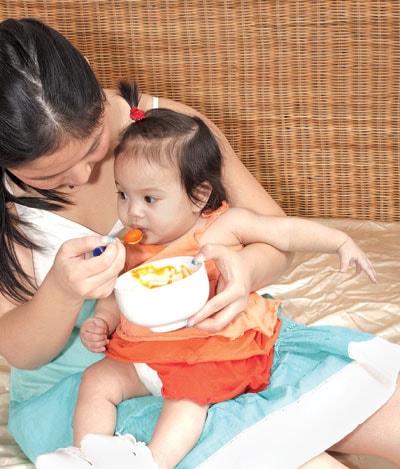Should we chew and feed food to children?
Chewing food and feeding it to children is not uncommon in Vietnam, but when it appears in the West, like the case of American actress Alicia Silverstone, it has caused a stir among many people.
Some have suggested that the actress may have intentionally passed bacteria from her mouth to her baby, even though 10-month-old Bear seems to enjoy being fed by his mother. However, scientists believe that chewing food is actually a traditional and healthy way to feed a baby. Chewed food mixed with the mother's saliva helps strengthen the baby's immune system, something that the baby does not get from pureed, sterilized, canned food.

Whether or not to chew food and feed it to children is an issue that is being researched by experts to find an official conclusion.
Photo: Shutterstock
The benefits of chewing and spoon-feeding have only recently been studied by Western medicine, but it appears to be on par with breastfeeding, according to Fox. Babies begin to need food other than milk at 6 months of age, when their digestive systems are ready to accept nutrients from solid foods, but their teeth don't develop fast enough to handle the need for chewing until they're 18 to 24 months old. According to research by anthropologist Gretel Pelto of Cornell University (USA), the act of chewing and spoon-feeding is a solution used in many cultures in modern times. Rather than being considered unhygienic, Pelto and many scientists think this method is a continuation of the immune-building process that began with breastfeeding.
By being exposed to traces of bacteria in the mother’s saliva, the baby’s immune system has a chance to process and learn to deal with similar strains of bacteria. It may also prevent the onset of autoimmune diseases like asthma, which are common in industrialized societies. Symptoms arise when the body’s immune system mistakenly attacks its own cells. These diseases are closely linked to low exposure to bacteria in childhood, according to Pelto.
The reason many people object to the act of spoon-feeding is that there are occasional cases of babies contracting infectious diseases through contact with their mothers' saliva. For example, women with HIV are advised not to spoon-feed their babies. However, research conducted by the University of Texas shows that the likelihood of such transmission is actually very low, because the natural antibodies in saliva greatly weaken the ability of bacteria to spread. Transmission through spoon-feeding is much lower than through breastfeeding.
Pelto concludes that while the evidence base on the habit of chewing is not yet complete, the reasoning is strong and the research supports the argument that this practice can save lives by ensuring good nutrition and contributing to a healthy immune system.
According to Thanhnien
